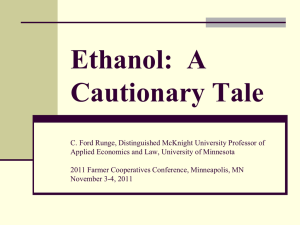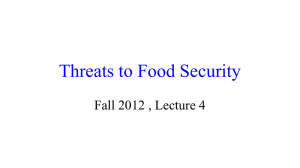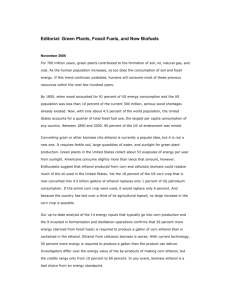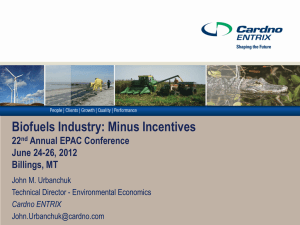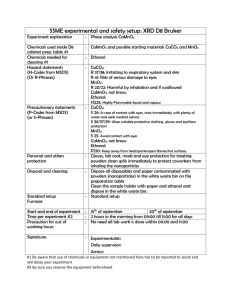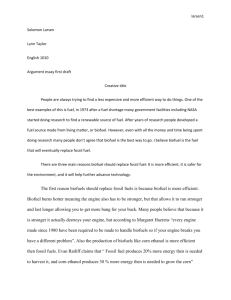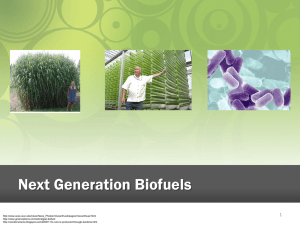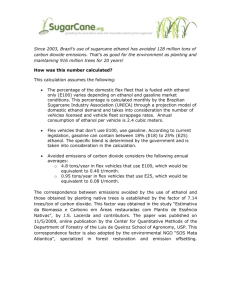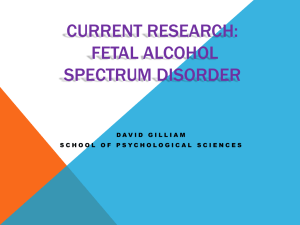File
advertisement
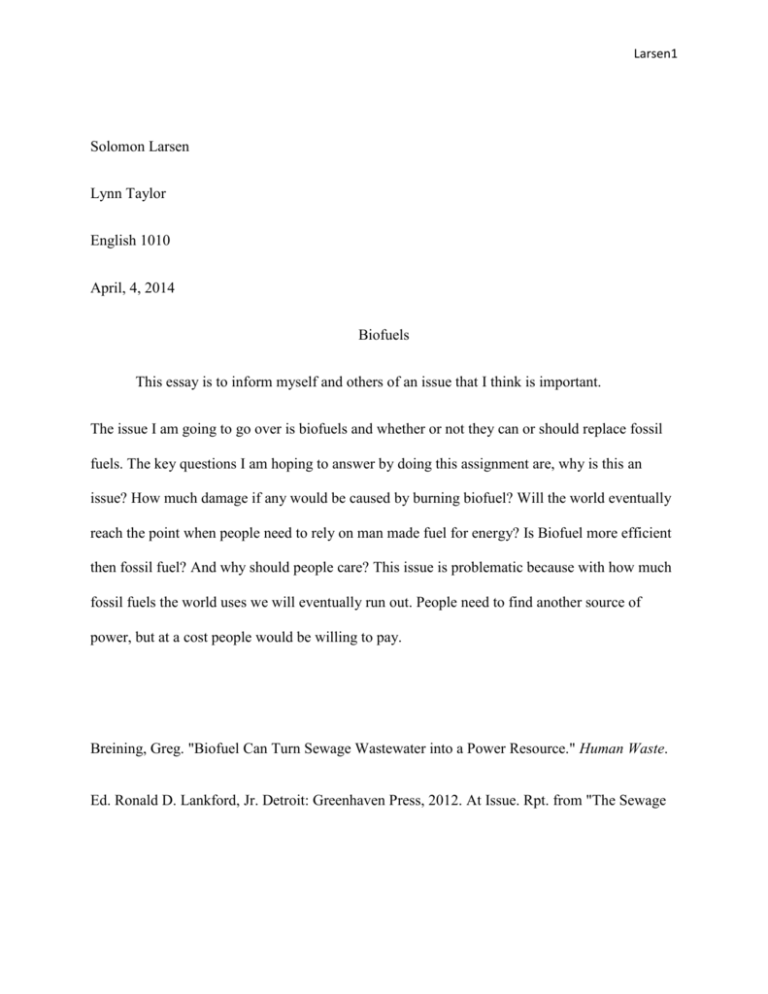
Larsen1 Solomon Larsen Lynn Taylor English 1010 April, 4, 2014 Biofuels This essay is to inform myself and others of an issue that I think is important. The issue I am going to go over is biofuels and whether or not they can or should replace fossil fuels. The key questions I am hoping to answer by doing this assignment are, why is this an issue? How much damage if any would be caused by burning biofuel? Will the world eventually reach the point when people need to rely on man made fuel for energy? Is Biofuel more efficient then fossil fuel? And why should people care? This issue is problematic because with how much fossil fuels the world uses we will eventually run out. People need to find another source of power, but at a cost people would be willing to pay. Breining, Greg. "Biofuel Can Turn Sewage Wastewater into a Power Resource." Human Waste. Ed. Ronald D. Lankford, Jr. Detroit: Greenhaven Press, 2012. At Issue. Rpt. from "The Sewage Larsen2 Plant, the Promise of Biofuel." Environment 360. 2009. Opposing Viewpoints in Context. Web. 9 Apr. 2014. In the article “Biofuels Can Turn Sewage Wastewater into a Power Resource” Greg Breining writes about Roger Ruans research for “finding the fuel of the future.” For his research he decided to take a valuable recourse that no one else was willing to take, the sewer sludge from Minneapolis largest sewage treatment system. The university of Minnesota professor is looking into a very unlikely source to grow single-celled algae to make diesel-like biofuel. His research allows him to use one acre of algae even in a pond can be used to make up to 5000 gallons of biodiesel every year or 100 times as much as soybeans. Greg goes on to say that this research will not only make the fuel needed for todays society but it will also clean up all the waste water, potentially saving millions of dollars a year. Ruen a professor in bio systems and agricultural engineering says, the potential of algae based biofuels is much higher then soybeans or corn oil because it grows at a much faster rate. Greg reports that Ruen wasn’t the only one with this idea in 2006 a company in New Zealand called “Aqua-flow” started successfully harvesting biofuel from open-air ponds at a waste water placement plant. They started focusing on making jet fuel and expect to be able to mass produce the fuel. This research caught the attention of the pentagon as an alternative resource for jet fuel. A team at the University of Virginia starting doing research to maximize the Larsen3 efficiency of the algae growing process, and the chemistry department of the Old Dominion University in Norfolk, Va, built a small scale bio reactor at a local wastewater treatment plant that may produce up to $600,000 worth of fuel a year. Even NASA has started a team researching and working on the development of a floating greenhouse for growing algae. A team at the University of Virginia starting doing research to maximize the efficiency of the algae growing process, and the chemistry department of the Old dominion University in Norfolk, Va, built a small scale bio reactor at a local wastewater treatment plant that may produce up to $600,000 worth of fuel a year. Ruen states that there are two methods of converting algae into fuel. Drying and crushing the algae, or removing the oil with a solvent. The problem however is that there both really expensive, researchers are trying to find a new way to break down algae through osmotic or ultra sound to make oil recovery easier. Greg Breining’s article is convincing because he quotes many credible source like Ryan Ruen, a professor in bio systems and agricultural engineering, The Pentagon , and even NASA to make a point that biofuels is something the world needs and everyone is trying to find a way to produce it efficiently and costly. Bryce, Robert. "The US Corn Ethanol Subsidy Is Harmful." Biofuels. Ed. Margaret Haerens. Detroit: Greenhaven Press, 2012. At Issue. Rpt. from "The Ethanol Trap." Slate. 2010. Opposing Viewpoints in Context. Web. 14 Apr. 2014. Larsen4 In the article “The US Corn Ethanol Subsidy Is Harmful” Robert Bryce talks about corn ethanol in what he calls “a scam” Bryce claims that the biofuel industries have to keep being bailed out by tax payers because the industry was given too much in the way of “subsidies and mandates”. And the only way to solve the problem is what else other then more subsidies and mandates. He states that in the 2005 energy bill, congress dramatically increased mandates for corn ethanol. Banks donated billions of dollars into new distilleries. The industries are getting funds to make ethanol even though they are over there capacity, money is being wasted because the industries are making more fuel then the motor fuel market can buy and sell. Bryce reports that the ethanol industries rely on gasoline and other fuel industries because there product can mixed into other fuel to make it stronger. He claims that there are about 250 million motor vehicles in the United States, and of that number only about 7.5 million was designed to burn gasoline containing ethanol. In his research Bryce found hat using ethanol can damage the environment and pollute the air. Even the EPA has admitted that increased use of ethanol will result in worse air quality. The last section of his article Bryce talks about the affect ethanol is having on the food supplies. In 2009 the Earth Policy institute estimated that in 2009 the U.S ethanol industries used 107 million tons of grain or 25% of total domestic grain production to make there fuel. The Institute claimed that is enough to feed 330 million people for almost a year. Larsen5 The purpose of this article is to inform people that biofuels aren’t as good as everyone thinks and it will cause more damage to the world if we continue to use them. Bryce is a reliable source because he I a well known publisher who’s articles have shown up in many publication ranging from Wall Street Journal to Counterpunch, in this article he also references the EPA and the Earth Policy Institute. Leonard, Kirk. "Corn Ethanol Is Not a Disaster." Biofuels. Ed. Margaret Haerens. Detroit: Greenhaven Press, 2012. At Issue. Rpt. from "In Defense of Corn Ethanol." The Organic Center, 2009. Opposing Viewpoints in Context. Web. 8 Apr. 2014 In Margaret Haerens article “Corn Ethanol Is Not a Disaster” She talks about oil based biofuel. Haerens claims Biofuel is a necessary piece of the energy transition we must do to sustain ourselves and our planet. Corn ethanol is a common topic for naysayers because it causes deforestation, food shortage and food price increase. She claims that, in 2007 studies showed that corn ethanol only raised families food bills by 0.2-0.3% "variations in the corn price 'explain' only 4% of the variations in the food CPI (Consumer Price Index)” In other words corn price would be considered a very small variable in deciding what drives the food CPI. Another one of the main issues with ethanol is engine problems. She points out that every engine made since 1980 have been required to be ethanol compatible, so if your experiencing problems with ethanol based fuels something else is wrong. Margaret Haerens says that the purpose of this Larsen6 article isn’t to say that corn ethanol is good. Because it is not a good source of long-term bio fuel solution, but in the U.S it has paved the way for future fuel sources. It is the principal oxygenate in todays gasoline. The world needs the experience gained by its development so we can start on cellulosic ethanol, the next generation of bioethanol worldwide. Margaret Haerens is neutral on this topic. She claims that corn based biofuels isn’t the best source of energy but the production is necessary to find the right fuel source for the future. Margaret Haerens is a credible source of information because she is a successful author who writes books about public issues. "Using Human Waste for Energy Is Problematic." Human Waste. Ed. Ronald D. Lankford, Jr. Detroit: Greenhaven Press, 2012. At Issue. Opposing Viewpoints in Context. Web. 8 Apr. 2014. Lankford’s point of view is against biofuels. He claims that the main component in most biofuel is sewage sludge. He states that manure is a common source of fuel but human and animal wastes aren’t the same. But burning sewage sludge can be more hazardous and not because of all the reasons you might think. Everything gets dumped into the sewer at factories and at home everything that goes down the drain ends up in the sewer treatment system, the main problem is industrial chemicals, oils and solvents go down the drain. Most of the extra chemicals get separated in the sewer Larsen7 treatment system but many chemicals like mercury or sometimes even some radioactive chemicals will get mixed in with the sludge. Burning the sludge will release many of these chemicals into the air. Lankford claims that even the best emission control systems can’t remove all the heavy metals and other unpleasant items from the gases going up in smokestack. Whether or not sludge causes more pollution then coal or oil depends on the components that got mixed in. This article was written by Ronald D. Lankford. This is a credible source of information because he works for the Green Haven Press that mainly published books and articles on social issues. The main purpose of this article is to inform people of the dangers burning biofuels can cause. This article is very convincing because it gives good examples and reasoning. Ratliff, Evan. "Cellulosic Ethanol Shows Promise." Biofuels. Ed. Margaret Haerens. Detroit: Greenhaven Press, 2012. At Issue. Rpt. from "One Molecule Could Cure Our Addiction to Oil." Wired 15.10 (24 Sept. 2007). Opposing Viewpoints in Context. Web. 9 Apr. 2014. In the article “Cellulosic Ethanol Shows Promise” Evan Ratliff Talks about cellulose ethanol. Cellulose ethanol has the potential to be the next fuel source but scientist are struggling to make it affordable, part of the reason is because of the chemistry behind making it, cellulose is a hard molecule to break down in a cost effective way. Many scientists around the world have been researching to find a way to make it worth the cost. Larsen8 Ratliff claims that hydrogen is to far out and its hard to power our cars with wind or solar powered electricity. So the only other available option right now is ethanol. Unfortunately the only ethanol we can make efficiently today is from corn. Corn ethanol is easier to produce than cellulose but it generates at best 30% more energy than is needed to grow the corn so it’s barely worth the effort to produce. He goes on to say that cellulose ethanol in theory would be the best source of fuel, most plant species that can be converted to ethanol like switch grass for example, and have a very fast growth rate. According to research done by the US Department of Agriculture and Energy we can sustainably grow more then one billion tons of such biomass on available farm land, while using minimal fertilizer. But there are more ways to get cellulose then just plants Ratliff claims that two thirds of what we throw in our landfills contain cellulose and thus a potential fuel source. Cellulose ethanol holds about 80% more energy than is needed to grow and convert it. There’s so much research and funding going into this project but the only problem is that no one can figure out how to generate energy from plant matter at a good price that people would be willing to pay. Even Ratliff is a credible source because he is the CEO and co-founder of Atavist, a media software company. And was a writer for “Wired Magazines” and “The New Yorker”. In his article "Cellulosic Ethanol Shows Promise." He references the “US Department of Agriculture and Energy”. The purpose of this article is to convince others that biofuels is the only other source of fuel that has the potential to replace fossil fuels. Even though it can cause damage by increasing food prices or pollution, that is a government project that needs to be done to sustain the future of energy. This article compares to the other article by talking abut similar problems for example, corn ethanol may increase the price of corn in markets. This article was a Larsen9 very useful source in my research because it talks about the advantages and disadvantages of biofuels and what the rest of the world is doing about it. By doing this essay I have learned a lot about this topic and have answered all of my questions. I have learned that the reason this is an issue is because the world will eventually run out of fossil fuels and we need to start looking for an alternative source of fuel, This is also an issue because there are many different ways to make biofuels but so far there isn’t a way to make it worth the cost or without causing food price increase. In my research I also found that the damage caused by burning ethanol varies depending on what ingredients are put in for example corn ethanol is a little bit cleaner then fossil fuels, and biofuels made from sewer sludge can be clean or it can cause pollution depending on what chemicals are still in it after it went through the sewer treatment system. Another question I answered is whether or not the world will have to eventually rely on man made fuel. The answer is yes, although there are other sources of energy such as solar or wind power. It’s hard to make an affordable car that will run off something other then fossil or biofuels. One question I answered was whether or not biofuels is more efficient then fossil fuel. I did find out that harvesting fossil fuels is more efficient then making biofuels, but the performance is the same as long as your engine was built to burn ethanol. The answers to all my questions are also the answer to my final question “why should people care?” From my research I have decided that my personal view is with biofuels. I agree that we should produce biofuels because it is the only other alternative to fossil fuels. I believe to progress further we need to perfect and mass produce a potential source of unlimited energy. All though it may cause some damage along the way, it would also help a lot of people. If the world Larsen10 just switched to solar powered energy and stopped using fuel altogether, what would happen to all the people who cant afford to switch? In my point of view the only way we can change our main source of energy without leaving anyone behind in the past is through the production of biofuels.

